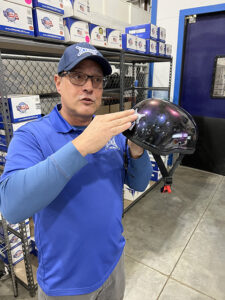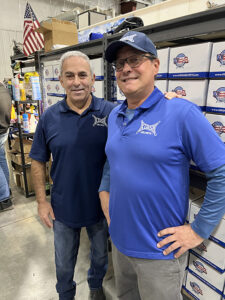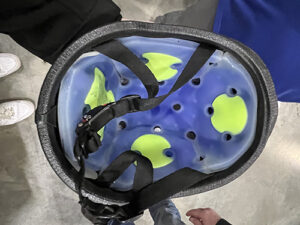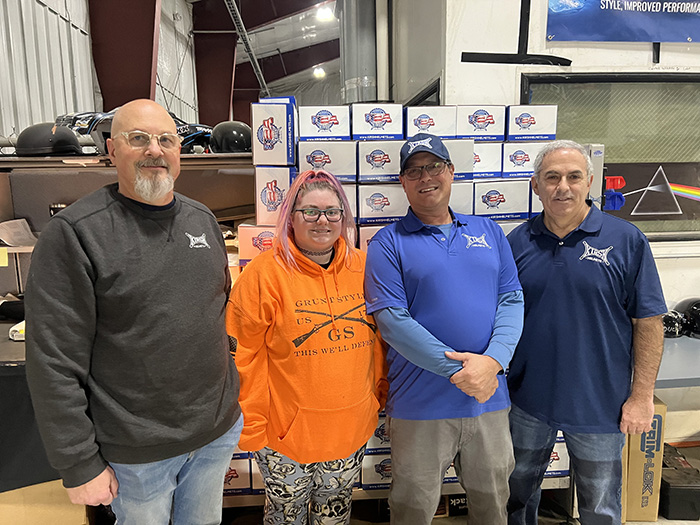By Zander Frost, Chronicle Staff Writer

Jason Kirshon says his company, Kirsh Helmets, is revolutionizing helmet technology, right on Big Boom Road in Queensbury. “The magic ingredient,” he says, is their patented liquid filled liner.
“We’re competing against foam,” Mr. Kirshon said. “We’re a medical grade platinum-cured silicone fluid. I didn’t skimp. I’m not shopping parts for cheapness, right? I’m looking to make the most effective helmet on the planet, priority one.”
Kirsh employs 16 people, including in their Scotia office. In Queensbury they make the liquid filled liner and do final assembly, packaging and shipping. They’re situated in a fenced-off corner of an open warehouse shared with other businesses just east of Northway Exit 18.
There’s a large work table, rows of helmet boxes, and a controlled back room.
Located adjacent to Seeley Machine
“Seeley Machine is a great partner to work with. They’re my landlord, but they also make the molds for my liners,” said Mr. Kirshon.

He is the firm’s chairman, chief executive officer and chief technology officer. Partner Donnie DeVito is president and chief operating officer.
Mr. Kirshon says Queensbury is “a great place to be, we have opportunity to start small and grow big.”
For now they’re focused on motorcycles, but Mr. Kirshon says their technology has wide-reaching possibilities.
“Our whole system reacts totally different than anything else out there,” he said.
Their helmets are much smaller and denser than larger and lighter traditional motorcycle headgear.
He said Kirsh helmets are currently sold in 85 stores — a number they hope to significantly grow by the end of next year. Prices starts at $249.50 on their website.
‘Mountain we have to climb’
There are challenges ahead.
They’re looking for investors to help them grow. Plus, their helmets are heavier and more expensive than typical ones.
“There is an education process that has to get to the consumer,” Mr. Kirshon said, “before that demand cycles.”
He said the helmet’s weight initially scares some riders. But with its small profile and fluid interior, “when you experience it, the helmet actually disappears.”
He wants people to try them out before buying. “Every store, we supply them with demo helmets that are meant for, hey, take it for a full ride. You came here on your bike, try it out,” Mr. Kirshon said.

“All the skeptics change their tune,” he said. “And I love it when that happens.”
“Nobody else does that because their helmets aren’t made to perform,” said Mr. Kirshon. “Where you buy it, it’s yours, you walk out that door, it doesn’t matter if it goes around on your head…chokes you, doesn’t matter if, half hour later, you find out pinch points on your forehead, and it’s extremely uncomfortable.”
He said Kirsh is pricier than standard helmets because of the cost of years of research and development — but that the price will come down. And they already have new lighter prototypes coming.
He said other companies are “perfectly happy with harvest mode…it’s cheap.”
“There is a little bit of a mountain that we have to climb,” Mr. Kirshon acknowledged. “It’s not like everybody’s gonna roll out the red carpet for this new amazing technology. We have to push, push, push…”
Self-taught, ‘started at the bottom’
Mr. Kirshon is self-taught. “I’m kind of a jack of all trades,” he said. “I worked in the marine industry for the majority of my career…I literally started at the bottom as a maintenance scuba diver, so, like, scrubbing boat bottoms, barnacles” in California and Florida.
“I spent my entire life in around water. And now I put it in helmets,” he joked.
Born in Poughkeepsie, Mr. Kirshon said he started coming to Lake George as a child. He moved here full-time around 2008.
A motorcyclist himself, he said he started working on the prototypes at home. “It’s just been a passion of mine, a dream. And it was a goal of mine to create new helmet technology.”

He said he would fly to California to test the helmets, “and my first prototype did amazing.”
He said he met Mr. DeVito in 2016. They started the company together in 2017.
“It was a great environment to meet in, because we were at an RPI event where I was surrounded by engineers” Mr. Kirshon said. “I hadn’t been practiced at talking about the technology — actually quite the opposite. I was practicing not talking about technology for years,” he said, until he got it patented.
Mr. Kirshon said the engineers “just asked great questions. And it flowed. And I just answered the questions, straightforward and honest.”
Started at Schenectady incubator
From there, they said Kirsh Helmets started at NYBizLab, a start-up incubator in Schenectady. “Highly recommend it,” Mr. Kirshon said. “You get a lot of support, you get what you need to get started. Everything’s right there.”
As for the manufacturing process, he said, “Everything is sourced rather locally. Some of it’s not right around the corner, but it’s all American made.”
He said that the shell combined with “fluid on the inside” provides “omni directional give, laminar flow,” that creates a helmet he says is incredibly safe.
Mr. Kirshon said the helmets are all Department of Transportation certified, with outstanding marks.
A big thrust of Mr. Kirshon’s pitch is that other helmets on the market aren’t innovating and are often of dubious quality. He claims his helmets actually protect in more ways than the DoT tests for.
Smashed helmets proof of testing
He has evidence of all the tests Kirsh helmets have gone through, too — piles of helmet shells and dummy heads surrounding a roughly 20 foot tall “CadeX Monorail DoT Impact Tester.”
The massive device smashes helmets into hard surfaces according to very specific DoT regulations.
“I have killed many children here,” Mr. Kirshon joked. “All my helmets are my children.”
“There’s death row back there of thousands of helmets that we have impacted over time. Even in the back, there’s piles and piles of smashed helmets….
“For a long time, my day to day life was just smashing helmets, doing what I can to get to the next step.”
The company believes its technology can save lives.
Mr. DeVito, the president/COO, said a customer wearing the helmet survived a bad crash. “He had the light, a box truck ran the red light, and as he swerved, he skid, and then his head was hit by the grill of the truck. He dented the grill…but did not hurt his head and he was actually bounced into a standing position.”
Copyright © 2022 Lone Oak Publishing Co., Inc. All Rights Reserved
 Glens Falls Chronicle Serving the Glens Falls/Lake George region; Warren, Washington and northern Saratoga counties since 1980
Glens Falls Chronicle Serving the Glens Falls/Lake George region; Warren, Washington and northern Saratoga counties since 1980

